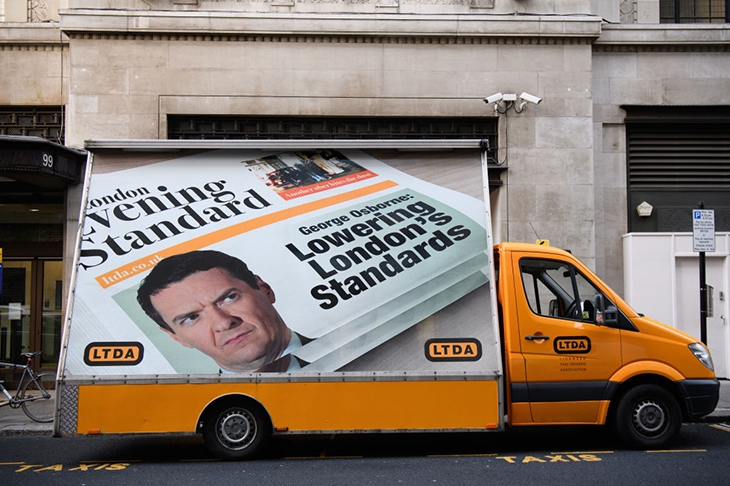Dear George Osborne, I thought it worth passing along some advice about your new job. I’ve never edited a news-paper, but I’ve been in the business for 32 years and I’ve seen a fair few come and go. I’ve also worked for the Evening Standard in various capacities. Indeed, my first job in journalism was doing shift work on Londoner’s Diary.
That’s not a bad place to start on Fleet Street (your predecessor did) and you could do worse than sit at the desk for a few weeks. Liz Smith, the veteran American newspaper columnist, describes gossip as ‘news wearing a red dress and running ahead of the pack’ and there’s something in that. A good diary story, like a good news story, is something that a powerful person would prefer not to be published, and they’ll often use every weapon at their disposal to stop it, from calling the proprietor to threatening a libel suit. They may also resort to bribery — and it’s worth bearing in mind that not all bribery is unacceptable.
I don’t mean you should accept a free ride on their private jet. But if they offer you a better story about someone more prominent in return for dropping the offending item, that’s often a deal worth making. You may be surprised by how willing some of your friends are to screw over their nearest and dearest.
The first-ever piece of advice offered to me on Fleet Street was ‘Never go on holiday’, the point being that you might miss a big story. Case in point: Ivo Dawnay, Rachel Johnson’s husband. He was the Sunday Telegraph’s Washington correspondent when the Monica Lewinsky story broke, but the editor, Dominic Lawson, couldn’t get hold of him. Lawson was so incensed he dispatched another correspondent to Washington to winkle him out. He duly reported back: Ivo’s office was empty with a sign on the door saying: ‘Gone fishing.’ He parted company with the paper soon afterwards.
On the subject of sacking, I remember a veteran Fleet Street editor telling me that whenever he took up a new post he always made a point of firing the paper’s star columnist. Not because they were bad, but to put the fear of God into the rest of the staff. However, best to make sure the columnist in question isn’t a friend of the proprietor’s first. After Max Hastings fired Mark Steyn from the Telegraph he was ordered by Conrad Black to rehire him, no matter what the cost. Steyn got wind of this, found out what Hastings was paid and said he’d only come back if he got more. Hastings agreed, through gritted teeth.
I can feel you bridling at that last suggestion because, as a politician, you’ve done your best to avoid making enemies. Well, I’m afraid you’re going to have to ditch that. Good editors aren’t afraid to make enemies — it comes with the territory. Your first loyalty must be to your readers and that means always speaking truth to power, regardless of the impact on your address book. If one of your former parliamentary colleagues begs you not to run something — and he can’t offer you a better story in its place — just tell him you’ve recused yourself because of your personal connection and delegate the decision to your deputy. That’s what every other Fleet Street editor does. In reality, of course, you can never absolve yourself of responsibility for anything that appears in the paper. The buck stops with you, which means you should read everything before it goes to press.
As a general rule, you should cultivate a reputation as a bit of a cynic, while quietly holding fast to your principles — the opposite of a scurvy politician. The usual manner in which newspaper editors do this is to feign a complete lack of sentimentality about natural disasters. I remember one distinguished broadsheet editor telling me that his reaction to the Indian Ocean tsunami that happened on Boxing Day in 2004, killing approximately 250,000 people, was ‘thank you, God’. When I couldn’t conceal my shock, he explained that there was usually no news in the week after Christmas. I don’t think he really meant it.
Above all, George, throw yourself into it. Roll your sleeves up and get ink on your fingers. Make mischief. Comfort the afflicted and afflict the comfortable. You may discover something that I’ve long suspected: being a newspaper editor is the best job in the world.







Comments